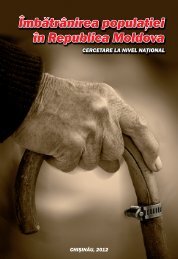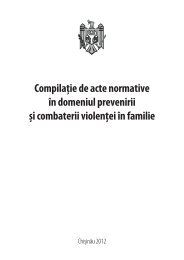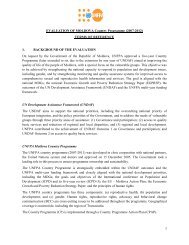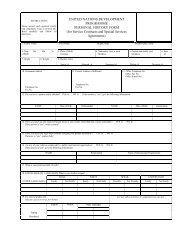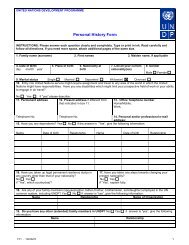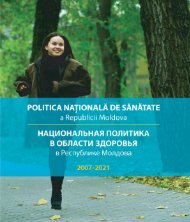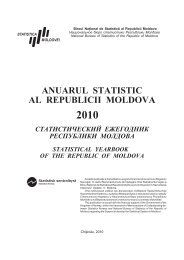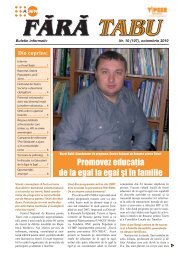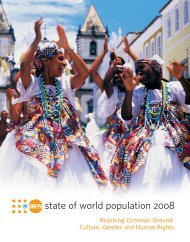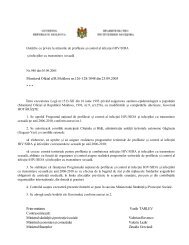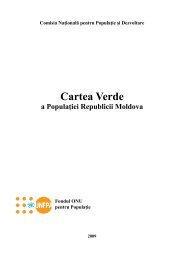Country Programme (2007-2011/2012) evaluation - UNFPA Moldova
Country Programme (2007-2011/2012) evaluation - UNFPA Moldova
Country Programme (2007-2011/2012) evaluation - UNFPA Moldova
You also want an ePaper? Increase the reach of your titles
YUMPU automatically turns print PDFs into web optimized ePapers that Google loves.
<strong>UNFPA</strong> programme components. Second, it can serve as a platform for the still non-existent<br />
comprehensive approach for the integration and coordination of social policies.<br />
• The platform of family policies also offers an opportunity for <strong>UNFPA</strong> to engage with migration<br />
policies and address a still unexplored area of policies related to migration in the country. From<br />
an economic, social and demographic point of view it would be desirable that migrants stay in<br />
permanent contact with <strong>Moldova</strong>, even after the first generation of migrants. Policies, which<br />
create links and incentives for permanent contact, investment or even return, should be<br />
developed. <strong>UNFPA</strong> <strong>Moldova</strong> should explore the possibility to engage in this area, possibly with<br />
IOM as a natural UN partner for this sector.<br />
Gender component<br />
• Gender equality shouldbe a separate component of the next <strong>UNFPA</strong> CP and to address the<br />
followingissues:<br />
o Providing research, evidence-based advocacy and technical assistance to formulate and<br />
revise policies and legislation to promote gender equality.<br />
o Strengthening the institutional capacities of the government and civil society in the areas of<br />
gender analysis and mainstreaming.<br />
o Raising awareness on gender equality, reproductive rights, GBV, and male responsibility in<br />
RH.<br />
o Establishing women-friendly spaces and supporting other similar interventions for women’s<br />
empowerment with an emphasis on integrating RH, counselling and referral in such<br />
interventions.<br />
o Identifying and promoting areas of joint programming through the work of the UN-Women<br />
and UNICEF.<br />
• Continuing to mainstream gender equality under all sub-components of the <strong>Country</strong> <strong>Programme</strong>:<br />
o To assist the Government and other stakeholders to align <strong>Moldova</strong>n policies more strongly<br />
with UN and EU frameworks and universal principles of human rights and gender equality,<br />
<strong>UNFPA</strong> could support initiatives to inform the pro-natalist policy by critical analysis and<br />
comparative research based on the principles of gender equality and human rights; review<br />
of strategies used in other countries to encourage birth; development of alternative policy<br />
proposals to encourage childbirth (e.g., improving access to and quality of public<br />
kindergartens).<br />
o To strengthen gender equality and DV legislation; <strong>UNFPA</strong> can consider supporting<br />
consensus-building and strategizing meetings among key proponents of the law in addition<br />
to the current support for advocacy. Another important contribution would be to support for<br />
initiatives to identify gender-discriminatory laws and policies (on employment, family,<br />
pension, etc.), development of recommendations for their elimination, and related advocacy<br />
measures to be taken.<br />
<strong>UNFPA</strong> <strong>Moldova</strong> Extended <strong>Country</strong> <strong>Programme</strong> (<strong>2007</strong>-<strong>2011</strong>/12)<br />
Outcome Evaluation<br />
64



